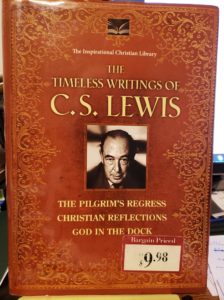
A few posts back I mentioned C.S. Lewis and trying to find the source of a quote attributed to him. I found it in my personal library. That caused me to keep that book in hand and read some in it. ‘Twas not so long ago that I finished a book, had one other one to work on, and wanted a second in my active reading pile. Perfect, I thought. Two thirds of this book is a compilation some of of his essays and lectures. Perfect, I thought. I can read it for a day or two and lay it aside.
The first I read was “The Humanitarian Theory of Punishment”, a Lewis magazine article anthologized in God In The Dock. The second was “Christianity and Culture”, an earlier magazine article anthologized in Christian Reflections. A bookmark showed that I had started reading this back in 2019 and got halfway through it. Perfect, I thought, I’ll finish this essay and go on to the next one.
And finish it I did, reading it slowly and closely, even rereading it, trying to absorb what Lewis was saying. After all, if I am a Christian and want to impact the culture around me, surely Lewis would give me helpful instructions, or at least suggestions and hints.
Alas, that’s not at all what this essay was about. By “culture” Lewis doesn’t mean it in a dictionary sense: “the customs, arts, social institutions, and achievements of a particular nation, people, or other social group”. Nor does he mean it as a verb in a scientific sense: “maintain (tissue cells, bacteria, etc.) in conditions suitable for growth”. No, by “culture” he means what I would call “cultured”: “characterized by refined taste and manners and good education”.
The gist of the essay was whether a cultured person could be a Christian.
First off, I dislike that term, cultured. It implies a type of refinement, a type of “better-than-others” implication. Maybe Lewis didn’t mean it in that way. Maybe it’s just another way to describe a segment of humanity to differentiate them from that part of humanity that has not had the best of education, and whose manners and tastes are not so refined. You know, to differentiate the hot dog eaters from the caviar eaters.
But my question is: Why is this even up for debate? Why take up a whole essay on this, Mr. Lewis? Surely we can find Christians in all walks of life, in all degrees of refinement.
Upon reflection, however, I think Lewis has a valid reason for asking this. Maybe in England there was a greater class distinction between the life of culture and the life of commonness. When Lewis was a schoolboy, all those charged with educating and guiding him saw he had an exceptional intellect. They steered him into the cultured life—a life of education, where he would then teach others. He ought to work with him mind, not his hands. He was a very willing participant in this, as he saw that he wanted to live this kind of life. He lived and breathed learning, hoping to become an Oxford don, and maybe even a professor.
World War 1 caused a delay in the education, but eventually Lewis was exactly where he wanted to be, at Oxford University, tutoring students and lecturing to attentive audiences. While he wasn’t wealthy (a condition usually associated with cultured people), he was living a life of culture, as he called it.
Then came Christianity, as from 1929 to 1931 Lewis moved from his atheism to belief in Jesus as the only begotten Son of God. His outlook changed along with his beliefs. But what didn’t change was his occupation or expectations of life. He was still living as a cultured person, still lecturing, still tutoring, still enjoying happy times with friends at the pub or on holiday walking tours. While his outlook on sin and holiness had changed, not much else had.
Fast forward to the end of the 1930s. Lewis began to wonder if this was right. If he made a radical change in his life by becoming a Christian, shouldn’t everything change? He asked the question: Can I live a life of culture now that I’m a Christian? If not, he would have to give up a lot: his way of making a living and his cherished activities of leisure.
According to Lewis’s article, he went through extensive studies to make a decision about this. He read major Christian writers from the past, the distant and then recent past, and concluded that nothing about being a Christian would require him to change his profession or give up those things he found enjoyment in. He continued to teach, continued to write books and essays and articles and lectures. Along the way, he added defending the Christian faith. And millions of people through the decades are glad that he did.
I think what Lewis went through is worthwhile for everyone to go through when they make a commitment to Jesus. Does my way of life—my work, my recreation, my habits, my friendships—need to change, either marginally or drastically, to live the life God wants me to live? Perhaps I’ll explore this some more in future posts. For now, I think I’ll re-read “Christianity and Culture” again to make sure I fully understand Lewis’s conundrum.